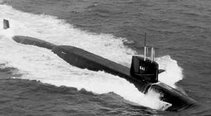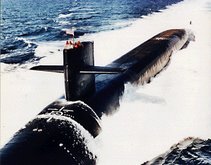IFF = Identification Friend or Foe
When I think of China, I end up falling into one of two mindsets. On the one hand, I tend think of both the ancient and modern Chinese civilizations their contributions to the worlds of art, science and trade. I also see China’s current economic growth as a sign of prosperity for the Chinese people, a change from an isolationist past and possibly a catalyst to a more democratic government. Then I think of the other China, the one of Tiananmen Square oppression, political executions, millions dead in purges and a history of confrontation and friction with its immediate neighbors. Like most communist nations China has a terrible history when it comes to human rights.
The recent disclosure of an underground submarine facility at the Jianggezhuang Submarine Base in China had me pondering my two China paradox. What exactly is China a political friend or foe, an economic competitor or trading partner? For those who discuss such things there is debate and disagreement on China’s exact relationship with the United States. This is the case even within the Bush administration.
One school of thought is that direct armed conflict with China is impossible. The logic here is that economic interdependence and globalization makes direct conflict too costly for either party and therefore the most serious problems will be resolved through dialog. This theory is called commercial liberalism (pdf).
Thomas P.M. Barnett author of the book “The Pentagon’s New Map” wrote an article for Esquire titled “The Chinese Are Our Friends” last November that comes close to the commercial liberalism position. But Mr. Barnett’s chief and continuing complaint seems to be with what he calls “proponents of Big War“ the Navy and Air Force leadership that advocate large and expensive weapon systems. He implies that this “Big War” crowd is self motivated and is using inflated China threat claims to justify big ticket weapons procurement. From October 2001 to June 2003 Thomas Barnett served as Assistant for Strategic Futures in the Office of Force Transformations, Office of the Secretary of Defense.
The opposing opinion comes directly from the recently released Pentagon's 2006 Quadrennial Defense Review (QDR) which states that China has the "greatest potential" to overtake the present U.S. supremacy unless the United States acts to counter that by developing new capabilities of its own. (Listen to the NPR report with a brief summary on the QDR from Feb 9 here.) The QDR cites expanding Chinese military capabilities and modernization, recommending the positioning of six aircraft carriers and 60% of the attack submarines in the Pacific. From the QDR on China:
Chinese military modernization has accelerated since the mid-to-late 1990s in response to central leadership demands to develop military options against Taiwan scenarios. The pace and scope of China’s military build-up already puts regional military balances at risk. China is likely to continue making large investments in high-end, asymmetric military capabilities, emphasizing electronic and cyber-warfare; counter-space operations; ballistic and cruise missiles; advanced integrated air defense systems; next generation torpedoes; advanced submarines; strategic nuclear strike from modern, sophisticated land and sea-based systems; and theater unmanned aerial vehicles for employment by the Chinese military and for global export. These capabilities, the vast distances of the Asian theater, China’s continental depth, and the challenge of en route and in-theater U.S. basing place a premium on forces capable of sustained operations at great distances into denied areas.
Is the Pentagon overstating a China’s threat? I’m of the opinion that they maybe overstating China’s current capabilities, particularly when it comes to SSBN submarines, but they are also trying to read the tea leaves by evaluating trends within the Peoples Liberation Army and Navy (PLAN). Planning for the "what ifs" is what the Pentagon does, so they're asking themselves what is the PLAN’s long term plan? China may not be able to challenge the U.S. military today but we would be foolish to let a still communist and oppressive government do so tomorrow. The QDR recommends the right force restructuring, hopefully the PLAN will continue to stumble in their modernization plans.









3 comments:
LL, China's longterm plan is as pressing for the US as it is interesting to us.
One thing to keep in mind is China's new need to maintain a fleet of nuclear submarines and munitions. Technically, they are up to the task, but if we think it is not an immense economic burden, we have only to look at what is happening to our own Navy.
As we seem to be reducing, China seems to be catching up. Not exactly. We are spending more wisely in leap frog fashion. Although China's economy is growing like gangbusters, they struggle with new, "domestic" needs (their per capita GDP is small by our standards, but the size of China's populace is still draining for them.)
Could they one day subdue the U.S.? All it would take is a series of 3 or 4 liberal administrations in our country to tilt the balance in China's favor, in my opinion.
Now you will appreciate the major advantage China has over us - their policies are rarely impacted by changes in their leadership.
Like you, I balance the threat/friend thing with China as carefully as I can. Barnett is right- there is a vested interest group in the Puzzle Palace that needs the "big threat" stick to wave for more money for very expensive projects. But as the saying goes, "just because you are paranoid doesn't mean that someone isn't out to get you."
Reagan had it right: "Trust but verify."
Vigils, I'm in agreement we need to think as the Chinese do, that being long term. Interesting that with the current flap over the UAE port deal no one is making a big deal that China already manages a number of west coast ports, not that any of their citizens flew planes into buildings, they just spy on US Military operations.
Eagle1, I think Barnett is correct but sounds a little too angry in his arguments about the "Big War" crowd. I find the truth is usually in the middle, with some of those expensive projects having real justification. Hard call and above my pay-grade, but as you point out with a wise quote from Reagan "Trust but verify".
Thanks Gentlemen for helping me think this through. -LL
Post a Comment